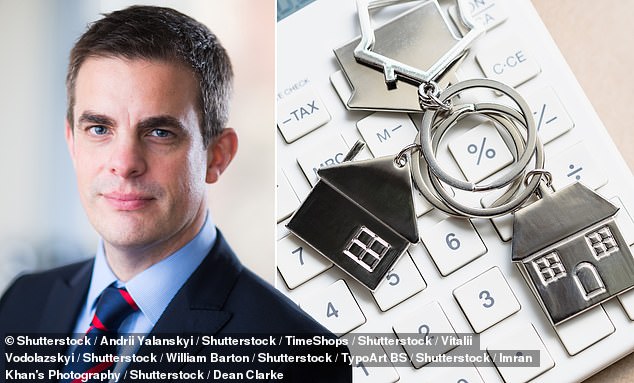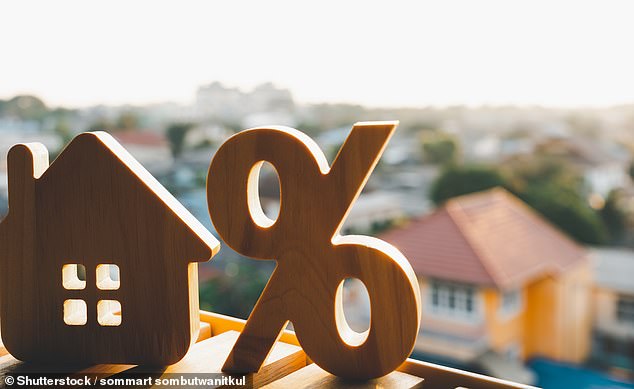My wife and I purchased a buy-to-let property in 2007 and it has turned out to be the worst financial decision of our lives.
We bought it for £155,000 with a £35,000 deposit, leaving us with a £120,000 mortgage. But the recession hit shortly after, and its value plummeted to £75,000.
The mortgage was initially interest-only but three years ago we moved to a repayment mortgage to try and reduce the debt. We have never missed a payment.
This property continues to drain all our finances and I cannot express to you the negative impact this has had on our lives. It has given us many sleepless nights.
The mortgage rate has recently gone up to 8.74 per cent (£949.07 per month) which is no longer sustainable for us. As we are in negative equity, we can’t switch to another bank.

Mortgage help: Our weekly Navigate the Mortgage Maze column sees broker David Hollingworth answering your questions
We also pay around £150 in management and agent fees, and the rent we make from the property is £500 per month.
We’ve considered handing back the keys to the bank but as we still have a mortgage on the home we live in, we are concerned about the impact on our credit file.
That mortgage has an outstanding balance of £94,000 and is currently on a 1.94 per cent rate (£702.84 per month). The deal ends in July. It is 25 per cent loan-to-value.
Should we refinance our own home to try and get the LTV down on the other nightmare mortgage? Could we repay small lump sums to try and clear it?
SCROLL DOWN TO FIND OUT HOW TO ASK DAVID YOUR MORTGAGE QUESTION
David Hollingworth replies: Negative equity is a phrase that will fill any homeowner with dread. This is when a drop in house prices means a property is worth less than the size of the outstanding mortgage.
House prices go up and down all the time, and negative equity will often not cause an immediate problem. Where the mortgage remains affordable, and the owner is happy to stay living in the house, there is no need to crystallise any loss.
But if that changes and there is a need or desire to sell, it can mean having to find additional funds to cover the outstanding debt.
It can also mean homeowners find it difficult to get a new mortgage at a reasonable rate, as you have found.
The sharp fall in prices following the financial crisis has clearly affected the options available to you. According to Nationwide’s house price index average prices in Northern Ireland, where you live, peaked in 2007 but fell sharply in 2008 and beyond.
There has been improvement in average prices over time, so finding out the current market value of your property will be critical. Seeking advice from your agent and others will help you get an accurate picture.
It’s a good idea to consider the position in the round, and handing the keys back will not rid you of any outstanding liability. It is therefore important to consider what options may be open, not only for the investment property in isolation but also on your main home.
> True cost mortgage calculator: Check what a new fixed rate would cost

Trapped: As our reader is in negative equity, it means they can’t switch to a different bank and are therefore at the mercy of the interest rates their current bank offers
Should the sell the buy-to-let property?
Importantly, you’ve kept up with your mortgage payments even though the rental income is not covering your costs.
It’s very common for buy to let investors to take the mortgage on an interest-only basis, preferring to repay it when the property is sold.
Your decision was not an unusual one, but by not reducing the debt over time, it means that the big drop in value has left you further underwater.
It looks like your buy to let mortgage is on a standard variable rate. The fact that you expect to still be in negative equity means that you can’t shop around the entire market and get a rate that makes your payments more manageable.
You could talk to your lender about options for existing customers, though. Many lenders will have alternatives for their existing customers even when the mortgage exceeds the property value.
They may be able to offer a slightly lower rate, though this may mean having to agree to early repayment charges so make sure that fits in with your plans.
Anyone facing difficulty in meeting mortgage payments should talk to their lender as they may be able to offer alternative options to help navigate the situation.
> What next for mortgage rates and should you fix for two or five years?

House price crash: Our reader purchased the buy-to-let property just before the 2008 financial crisis during which the property halved in value
Can their main home offset buy-to-let losses?
There are a few moving parts, but the timing is right to consider your overall position including the mortgage on your home.
You’ve had a low fixed rate, but that is coming to an end and will increase due to the higher rates now in play.
What is loan-to-value?
Loan-to-value is a measure of how much you are borrowing on a mortgage compared to a property’s value.
It is dependent on the size of deposit you can put down or the equity in your home.
Someone putting down a £10,000 deposit on a £100,000 home would need a £90,000 mortgage.
This is 90 per cent of the property’s value, so they would be borrowing at 90 per cent loan-to-value.
Similarly a homeowner whose property is worth £100,000 and has an outstanding mortgage of £90,000 could remortgage at 90 per cent loan-to-value.
Where the buy-to-let is at a very high loan to value, the position is very different on your main residence where you have 75 per cent equity.
That will give you access to the best rates on the market – but it also means that you have equity that you may be able to release, which could improve your overall financial position.
If your income can support larger borrowing on the main residence, this could enable you to borrow more – whether with the existing lender or from the open market.
If you then decide to sell the buy to let, the money released could allow you to cover any shortfall if the sale achieves less than the outstanding mortgage.
Alternatively, you might decide to use any money released to pay off some of the buy-to-let balance, which could open up access to better buy-to-let rates.
Buy to let lenders will still need to see that the rental income will cover the mortgage interest by a big enough margin, so you’ll need advice to get the right balance.
The latter option would leave you with the same aggregate borrowing, but may help reduce the total monthly outgoing, if you want to keep the property.
Selling the property will crystallise any loss, but could give you greater peace of mind, if you are able to manage any additional borrowing required to cover the shortfall.
GET YOUR MORTGAGE QUESTION ANSWERED
David Hollingworth is This is Money’s mortgage expert and a broker at L&C Mortgages – one of Britain’s leading specialists.
He is ready to answer your home loan questions, whether you are buying your first home, trying to remortgage amid the rates chaos or looking to plan further ahead.
If you would like to ask him a question about mortgages, email: [email protected] with the subject line: Mortgage help
Please include as many details as possible in your question in order for him to respond in-depth.
David will do his best to reply to your message in a forthcoming column, but he won’t be able to answer everyone or correspond privately with readers. Nothing in his replies constitutes regulated financial advice. Published questions are sometimes edited for brevity or other reasons.
News Related-
Up to 40 Tory MPs ‘set to rebel’ if Sunak’s Rwanda plan doesn’t override ECHR
-
Country diary: A tale of three churches
-
Sunak woos business elite with royal welcome – but they seek certainty
-
Neil Robertson shocked by bad results but has a plan to turn things round
-
Tottenham interested in move to sign “fearless” £20m defender in January
-
Bill payers to stump up cost of £100m water usage campaign
-
Soccer-Venue renamed 'Christine Sinclair Place' for Canada soccer great's final game
-
Phil Taylor makes his pick for 2024 World Darts Championship winner
-
Soccer-Howe aims to boost Newcastle's momentum in PSG clash
-
Hamilton heads for hibernation with a word of warning
-
Carolina Panthers fire head coach Frank Reich after 1-10 start to the season
-
This exercise is critical for golfers. 4 tips to doing it right
-
One in three households with children 'will struggle to afford Christmas'
-
Biden apologised to Palestinian-Americans for questioning Gaza death toll, says report
